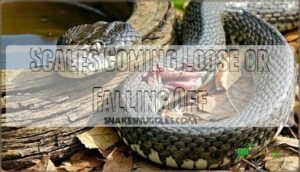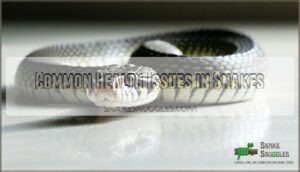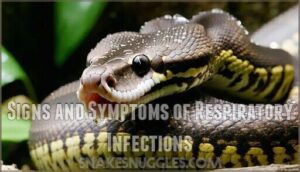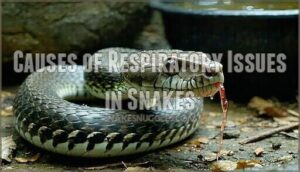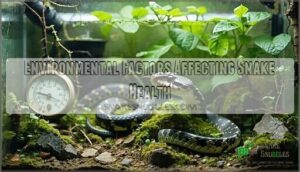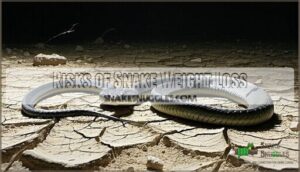This site is supported by our readers. We may earn a commission, at no cost to you, if you purchase through links.
 Snake weight loss causes typically stem from health issues or poor care conditions.
Snake weight loss causes typically stem from health issues or poor care conditions.
You’ll notice your snake shedding pounds when dealing with respiratory infections, parasites, or bacterial problems.
Environmental factors play a huge role too – wrong temperatures, humidity levels, or dirty enclosures can stress your scaly friend into losing weight.
Sometimes it’s as simple as feeding issues or seasonal changes affecting appetite.
Think of weight loss as your snake’s way of waving a red flag.
Regular weighing helps catch problems early, like having a built-in alarm system.
Recognizing these ten warning signs can mean the difference between quick treatment and serious complications.
Table Of Contents
- Key Takeaways
- Snake Weight Loss Causes
- What Causes Weight Loss in Snakes?
- Physical Signs of Weight Loss
- Common Health Issues in Snakes
- Recognizing Respiratory Problems
- Behavioral Changes Indicating Illness
- Environmental Factors Affecting Snake Health
- Preventive Measures for Snake Health
- Risks of Snake Weight Loss
- Seeking Veterinary Care for Weight Loss
- Frequently Asked Questions (FAQs)
- Why do snakes lose weight?
- What are the signs of illness in snakes?
- What happens if a snake has anorexia?
- What should I do if my snake weighs a lot?
- Are snakes shedding a problem?
- Are snakes prone to health problems?
- How can I tell if my snake is sick?
- What are some specific symptoms of common illnesses in snakes?
- Why is shedding a concern for snake health?
- What are some signs of respiratory problems in snakes?
- Conclusion
Key Takeaways
- Watch for behavioral red flags first – You’ll notice appetite changes, lethargy, and unusual hiding behavior before physical symptoms appear, so don’t wait for visible weight loss to take action.
- Environmental problems cause most weight issues – Poor temperature gradients, wrong humidity levels, and inadequate ventilation create stress that leads to appetite loss and weakened immunity in your snake.
- Health problems steal nutrients fast – Internal parasites, respiratory infections, and bacterial issues prevent proper digestion and nutrient absorption, causing rapid weight decline even when your snake is eating normally.
- Early veterinary intervention saves lives – Once you spot weight loss signs, you’ve got a narrow window to prevent serious complications like weakened immune systems, organ failure, and shortened lifespan through professional treatment.
Snake Weight Loss Causes
When your snake drops weight faster than a teenager abandons vegetables, you’re facing a red flag that shouldn’t be ignored.
Understanding the main causes – health problems, poor care practices, and environmental stress – helps you spot trouble before it becomes life-threatening.
Common Health Issues
Spotting the root causes behind snake weight loss starts with recognizing common health problems that silently sabotage your pet’s wellbeing.
Parasitic Infections steal nutrients, while Respiratory Infections make breathing labored. Metabolic Disease weakens bones, and Dietary Deficiencies crush immunity.
- Snake parasite infection: Internal worms interfere with nutrient absorption
- Skin Abnormalities: Dark patches or retained shed indicate illness
- Snake anorexia: Stress-triggered appetite loss requires immediate snake veterinary care
Early detection prevents these snake health problems from escalating.
Poor Husbandry Practices
Poor husbandry practices create a perfect storm for snake weight loss.
Your enclosure size might be cramped, while wrong substrate choice harbors bacteria.
Without proper temperature gradient and hiding spots, stress skyrockets.
Dirty conditions break hygiene protocols, inviting illness.
These improper environmental conditions and inadequate diet turn your snake enclosure into a health hazard, triggering dangerous weight loss.
Environmental Changes
Sudden shifts in your snake’s world trigger a stress response that leads to weight loss.
Changes in temperature, humidity, or lighting can throw off their appetite completely.
Your enclosure size, substrate type, and hiding spaces all matter more than you’d think.
Even small environmental changes create big problems – your snake’s body stops working properly when their comfort zone gets disrupted unexpectedly.
What Causes Weight Loss in Snakes?
Your snake’s weight loss usually happens for three main reasons: health problems like parasites or infections, poor living conditions, or changes in their environment that stress them out.
Think of it like a puzzle where you’ll need to check their appetite, activity level, and how they’re positioning themselves to figure out what’s going wrong, considering complete concepts to understand the issue.
Changes in Appetite or Feeding Habits
Your snake’s eating habits tell a story you need to read carefully. Appetite changes like refusing food or sudden anorexia often signal underlying health problems.
Your snake’s appetite whispers secrets about their health—learn to listen before it’s too late.
Watch for regurgitation issues – when your snake can’t keep meals down, it’s crying for help. Dietary imbalance from poor prey quality compounds these problems, creating a downward spiral.
Feeding frequency matters too. Some owners panic when snakes skip meals, but consistent refusal over weeks screams trouble.
Think of it like your friend suddenly hating pizza – something’s definitely wrong. Snake anorexia causes range from stress to serious illness, making prompt attention essential.
Altered Activity Levels or Lethargy
Noticing your snake moving like it’s stuck in slow motion? Lethargy causes range from temperature drops to serious health issues.
When decreased activity becomes the new normal, your pet might be signaling distress through reduced movement and unusual inactivity.
Watch for these activity changes that signal trouble:
- Hiding behavior that lasts days instead of hours
- Snake appetite loss paired with constant sleeping
- Refusing to explore during typical active periods.
Snake illness often starts with subtle shifts in energy levels. If your snake’s become a permanent couch potato, snake weight loss might follow close behind, which can be a sign of serious health issues.
Unusual Posturing or Resting Positions
When your snake’s usual coiled comfort turns into awkward angles, pay attention.
Head tilting, twisted spines, or limp positioning often signal neurological issues or muscle weakness.
These spinal abnormalities aren’t just quirky poses—they’re red flags for snake health problems that can trigger weight loss.
| Normal Position | Warning Sign | Possible Cause |
|---|---|---|
| Coiled naturally | Head twisted sideways | Neurological damage |
| Straight spine | S-shaped kinks | Spinal injury |
| Alert posture | Limp, drooping body | Muscle weakness |
| Active movement | Stuck in one pose | Lethargy signs |
Physical Signs of Weight Loss
You’ll notice weight loss in your snake’s body before you see changes on the scale, so learning to spot these visual cues can save your pet’s life.
Your snake’s spine might become visible like a ridgeline down its back, and you’ll feel ribs that weren’t there before when you handle your usually plump companion.
Lesions, Wounds, or Open Sores
Why do lesions, wounds, or open sores appear on your snake’s skin? These skin abnormalities signal serious problems that demand immediate attention and proper wound healing protocols.
Infection risk skyrockets when these issues go untreated:
- Bite wounds from cage mates or prey animals
- Scale damage from rough surfaces or burns
- Snake scale rot from excessive moisture
- Abscess formation requiring surgical drainage
Scales Coming Loose or Falling Off
When scales coming loose or peeling away from your snake’s body, you’re witnessing serious skin abnormalities that demand attention.
Scale Rot and Dysecdysis Complications from improper snake shedding often trigger this alarming symptom.
Fungal Infections, Trauma Injuries, or Nutritional Deficiencies can also cause skin issues where scales detach unexpectedly.
Think of it like bark falling off a stressed tree – your snake’s telling you something’s seriously wrong with their health.
Discoloration, Blistering, or Swelling
Watch for these telltale skin abnormalities that often accompany snake weight loss. Scale discoloration, blistering, and swelling signal serious infection signs requiring immediate attention.
Three critical skin lesions to monitor:
- Dark patches indicating bacterial infections
- Raised blisters from fungal attacks
- Localized swelling suggesting abscesses
These snake skin problems don’t resolve alone—they’re red flags demanding veterinary intervention before your snake’s condition worsens substantially.
Abnormal Odors or Discharge
Something’s fishy when your snake gives off abnormal odors or shows unusual discharge. These infection indicators signal bacterial or fungal problems that contribute to snake weight loss.
Different discharge types mean different troubles, while odor significance can’t be ignored.
| Problem Type | What You’ll Notice |
|---|---|
| Mouth Rot | Thick discharge, cheesy smell |
| Respiratory Issues | Clear discharge, musty odor |
| Skin Infections | Pus-like discharge, sour smell |
Veterinary diagnosis and proper hygiene impact matter most here.
Common Health Issues in Snakes
Several health problems can cause your snake to lose weight, and spotting them early makes all the difference.
From sneaky parasites stealing nutrients to respiratory infections that make eating difficult, these issues often hide behind seemingly normal behavior until they become serious, and respiratory infections are particularly concerning.
Respiratory Infections and Pneumonia
Respiratory infections and pneumonia lurk like silent predators in poorly ventilated enclosures.
You’ll notice open-mouth breathing, wheezing sounds, or mouth discharge when these respiratory problems strike your snake.
- Humidity impact: Incorrect levels create breeding grounds for bacteria
- Secondary infections: Untreated respiratory issues spread rapidly throughout your snake’s system
Prevention tips include maintaining proper ventilation and seeking immediate treatment options.
External Parasites and Mites
External parasites like mites are sneaky hitchhikers that’ll drain your snake’s energy faster than you’d expect. These tiny vampires cause mite anemia through constant blood-sucking, while ticks pose tick transmission risks for various diseases.
You’ll spot frequent soaking, excessive rubbing, and visible specks crawling around your pet.
| Parasite Type | Signs |
|---|---|
| Snake mites | Tiny moving dots, frequent soaking |
| Ticks | Swollen bumps, skin irritation |
| Lice | Scratching, skin damage |
| Fleas | Jumping insects, red bite marks |
Proper quarantine protocols and parasite management prevent these freeloaders from establishing colonies. Remember, some reptile parasites carry zoonotic risks, so wash your hands after handling affected snakes.
Internal Parasites and Worm Infestations
Invisible invaders like helminths and other internal parasites steal nutrients from your snake’s digestive system, causing dramatic weight loss despite normal feeding.
These common culprits interfere with nutrient absorption and create zoonotic risks for handlers.
Essential prevention steps include:
- Regular fecal exams to detect reptile parasites early
- Strict quarantine protocols for new snakes
- Veterinary treatment for confirmed worm infestations
Bacterial and Fungal Infections
While parasites steal nutrients silently, bacterial and fungal infections attack your snake’s body directly.
These infections cause dramatic weight loss through inflammation and tissue damage.
Scale rot appears as dark, musty patches on belly scales.
Septicemia spreads through the bloodstream, causing rapid decline.
Abscess treatment requires surgical drainage and antibiotics.
You’ll notice unusual odors, swelling, or discolored patches on your snake’s skin.
| Infection Type | Common Signs | Weight Loss Cause | Treatment Approach |
|---|---|---|---|
| Bacterial | Redness, swelling | Inflammation, appetite loss | Antibiotics, wound care |
| Fungal | Patchy skin, odor | Tissue damage, stress | Antifungal drugs, hygiene |
| Scale Rot | Dark belly patches | Secondary infections | Topical treatment, drying |
| Septicemia | Rapid deterioration | Systemic organ failure | Emergency veterinary care |
Preventative hygiene keeps these nasty invaders at bay, ensuring the health and well-being of your snake through proper care and emergency veterinary care when needed, which can prevent systemic organ failure and promote wound care.
Metabolic Bone Disease and Nutritional Deficiencies
Calcium deficiency and vitamin D3 shortages trigger metabolic bone disease in your snake.
Poor snake nutrition weakens bones and muscles fast. UVB lighting helps calcium absorption, while dietary supplements fill nutritional gaps.
MBD prevention requires balanced feeding and proper temperatures. Vitamin deficiencies compromise your pet’s immune system.
Don’t let nutritional deficiencies steal your snake’s strength—proactive care prevents this sneaky bone destroyer.
Recognizing Respiratory Problems
When you hear your snake wheezing or notice it breathing through its mouth instead of its nose, you’re likely dealing with a respiratory infection that can quickly lead to serious weight loss.
These breathing problems often sneak up on owners because snakes naturally breathe quietly, so any sounds or visible mouth breathing should set off alarm bells faster than a smoke detector with a low battery.
Signs and Symptoms of Respiratory Infections
Your snake’s breathing patterns tell a story you need to hear.
Respiratory infections announce themselves through distinct warning signs that demand immediate attention.
- Mouth Breathing — snakes normally breathe through their nostrils, so open-mouth breathing signals distress
- Wheezing Sounds — audible gurgling or whistling during breathing indicates blocked airways
- Nasal Discharge — mucus or fluid from nostrils suggests infection
- Lethargy Signs — reduced activity accompanies respiratory problems
Causes of Respiratory Issues in Snakes
Poor husbandry practices trigger most respiratory infections in your snake.
Bacterial pneumonia develops when temperatures drop too low or humidity stays excessive.
Fungal infections like Aspergillus thrive in damp, poorly ventilated enclosures.
Viral causes weaken immunity, while environmental irritants from dirty substrates inflame airways.
Aspiration pneumonia occurs when snakes regurgitate food into their lungs during stress.
Importance of Proper Ventilation and Humidity
Airflow Benefits your snake’s Respiratory Health more than you’d think.
Stagnant air traps moisture, creating perfect conditions for Mold Prevention nightmares and breathing problems.
Proper ventilation paired with Humidity Control prevents snake respiratory issues while supporting Shedding Success.
Monitor your snake environmental conditions closely—balanced snake humidity and snake temperature with good airflow stops snake weight loss before it starts.
Behavioral Changes Indicating Illness
Beyond breathing troubles, your snake’s personality shift might tell you more about their health than you’d expect.
When your normally docile pet suddenly becomes a miniature dragon, it’s time to pay attention. Snake behavioral changes often signal underlying snake health problems before physical symptoms appear.
Watch for these telltale signs:
- Hiding Behavior increases dramatically – Your snake becomes a hermit, refusing to come out even during feeding time, which often leads to snake appetite loss.
- Reduced Activity paired with Erratic Movements – One day they’re sluggish, the next they’re thrashing around their enclosure like they’re auditioning for a snake horror movie.
- Aggression Changes and Regurgitation Signs – Sudden defensive strikes or bringing up meals indicate serious snake weight loss triggers.
These snake signs of illness aren’t your pet being moody – they’re crying for help in their own slithery way.
Environmental Factors Affecting Snake Health
Your snake’s environment acts like their personal thermostat and humidity control system, and when these settings go wrong, weight loss often follows.
Think of it this way: if you’d to live in a freezing cold room or a desert-dry space, you’d probably lose your appetite too, and that’s exactly what happens to snakes when their habitat isn’t just right.
Improper Temperature or Humidity Levels
When your snake’s world feels like a sauna or an icebox, trouble’s brewing. Improper temperature and humidity levels create a perfect storm for snake weight loss causes. Your pet can’t regulate body heat like you do—they’re completely dependent on their environment.
Temperature gradients matter more than you think. Too hot? Your snake becomes lethargic and stops eating. Too cold? Digestion slows to a crawl. Humidity impact shows up as shedding problems—stuck skin that won’t come off properly.
Potential Issues
Enclosure monitoring prevents thermoregulation issues. Check temperatures daily with reliable thermometers. Owners should consider purchasing a reliable temperature reader for their snake’s enclosure.
Inadequate Lighting or UVB Exposure
Light isn’t just decoration in your snake’s world—it’s medicine. Without proper UVB exposure, your snake can’t produce vitamin D3, which means calcium absorption goes downhill fast.
This domino effect leads to metabolic bone disease and contributes to snake losing weight.
Here’s what inadequate lighting does to snake health:
- Blocks vitamin D3 production completely
- Prevents proper calcium absorption in bones
- Weakens immune system over time
- Triggers MBD prevention failures
Establish consistent lighting schedules with quality UVB importance fixtures. Your snake’s bones depend on it.
Poor Substrate or Enclosure Conditions
Your snake’s home can become a silent health thief when substrate hygiene and enclosure conditions go wrong.
Snake poor husbandry creates environmental problems that steal your pet’s vitality.
- Moldy substrate breeds bacteria that attacks your snake’s immune system
- Cramped enclosure size restricts natural movement and causes chronic stress
- Poor substrate retains harmful moisture and creates respiratory nightmares
- Broken temperature gradient disrupts digestion and weakens your snake daily
Selecting the right snake bedding material is essential for their well-being.
Inadequate Hiding Places or Visual Barriers
Your snake’s stress reduction depends heavily on hiding importance and security perception.
Inadequate hiding places force snakes into constant alert mode, triggering snake stress from snake poor husbandry.
Smart enclosure design includes multiple hides and visual barriers to create safe zones.
Without proper shelter, the behavioral impact shows through weight loss, decreased appetite, and weakened immunity.
Preventive Measures for Snake Health
You can prevent most snake weight loss issues by staying ahead of problems rather than chasing them after they start.
Think of it like changing your car’s oil regularly instead of waiting for the engine to knock – proper enclosure setup, regular vet visits, and consistent feeding schedules keep your snake healthy and save you from emergency trips to the reptile clinic, which is a result of staying ahead of problems.
Proper Enclosure Setup and Maintenance
Your enclosure setup directly impacts your snake’s weight and health.
Choose proper enclosure size with adequate hiding spots and maintain temperature gradients from 75-95°F.
Control humidity levels between 50-60% and guarantee substrate hygiene through weekly cleaning.
Selecting the right enclosure size is vital for your snake’s well-being.
Poor husbandry practices like cramped spaces or dirty bedding create stress that leads to appetite loss and weight decline.
Routine Veterinary Check-ups
Just like your annual doctor visits, routine veterinary check-ups keep your snake healthy before problems arise.
A reptile veterinarian provides early detection through parasite screening and husbandry review, catching snake weight loss causes early.
Preventative care beats emergency visits every time.
Most snakes need annual exams, though older pets benefit from twice-yearly snake veterinary checkups for ideal snake health.
Balanced Diet and Feeding Schedule
Following regular vet visits, feeding your snake properly becomes your next line of defense against snake weight loss causes.
A well-planned snake balanced diet and snake feeding schedule prevent nutritional deficiencies that weaken your pet’s health.
Your snake diet success depends on four key factors:
- Feeding Frequency – Young snakes eat weekly, adults every 2-3 weeks
- Portion Control – Prey should match your snake’s thickest body section
- Prey Variety – Rotate different prey types for complete nutrition
- Supplementation Needs – Add vitamins when recommended by your vet
Don’t forget hydration importance – fresh water prevents dehydration-related weight loss.
Maintaining Proper Temperature and Humidity
When your snake’s environment feels like a tropical vacation in one spot and an arctic tundra in another, you’ve mastered temperature gradients.
Create a warm basking zone (88-92°F), comfortable middle ground (78-82°F), and cool retreat (75°F). Improper temperature disrupts digestion and weakens immunity, leading to weight loss.
Humidity levels need equal attention—too dry causes shedding problems, too wet breeds bacteria. Use reliable heating sources like under-tank heaters and ceramic emitters.
Humidity monitoring with accurate hydrometers prevents guesswork. Environmental factors like poor enclosure ventilation create stagnant air.
Think of yourself as your snake’s personal weather station operator.
Risks of Snake Weight Loss
When your snake loses weight, you’re looking at more than just a skinny pet – you’re seeing a weakened reptile that’s vulnerable to serious health problems.
Rapid weight loss puts your snake at risk for infections, reduced mobility, and potentially shortened lifespan, making early intervention essential for their survival.
Weakened Immune System
When your snake’s losing weight, its immune defenses crumble like a house of cards.
This weakened immune system transforms minor threats into major snake health issues, requiring immediate snake veterinary treatment. Dietary Impact and Environmental Stressors compound the problem, while Stress Factors pile on additional pressure.
Infection Susceptibility skyrockets, making your pet vulnerable to diseases that healthy snakes easily fight off.
Here’s what breaks your heart as an owner:
- Watching your once-vibrant snake become lethargic and withdrawn
- Seeing recurring infections that won’t heal properly
- Feeling helpless when snake health symptoms worsen into serious complications
- Worrying constantly about your pet’s declining condition
- Questioning if Supplement Benefits can reverse the damage
Decreased Mobility
When your snake seems sluggish or struggles to move, it’s not just being lazy—it’s waving a warning flag.
Decreased mobility can stem from Muscle Atrophy, Joint Stiffness, or even Neurological Problems.
Spinal Issues or snake muscle loss might also play a role.
Watch for signs like Impaired Shedding or awkward movements.
Ignoring these snake health issues could worsen their condition fast.
Shortened Lifespan
Beyond movement troubles, snake losing weight creates a domino effect that shortens life substantially.
Chronic stress from malnutrition triggers immune decline, making your pet vulnerable to organ failure.
Snake emaciation prevents limited reproduction and accelerates aging.
While some genetic predisposition exists, snake health problems from weight loss cut years off their natural lifespan—sometimes by half.
Increased Risk of Infection
Weight loss compromises your snake’s defenses, creating perfect conditions for bacterial infection and viral infection. A weakened immune system can’t fight off threats effectively, leaving your pet vulnerable to serious health complications.
Immune suppression opens doors to dangerous problems:
- Opportunistic pathogens exploit weakened defenses
- Wound infections develop from minor injuries
- Poor hygiene protocols worsen contamination risks
Quarantine importance becomes critical when your snake losing weight shows infection signs.
Seeking Veterinary Care for Weight Loss
When you notice your snake losing weight, don’t wait for the problem to solve itself like hoping your homework will magically disappear.
Getting professional veterinary care quickly can mean the difference between a simple treatment and a serious health crisis that’s much harder to fix.
Choosing a Reptile-Specialized Veterinarian
Several factors separate good reptile veterinarians from great ones when your snake’s losing weight.
Vet qualifications matter most – look for exotic animal training and reptile experience.
Emergency care availability can save lives.
Cost considerations shouldn’t overshadow expertise, but transparency helps.
Building rapport guarantees comfort during stressful veterinary consultations for superior snake health outcomes.
- Your snake’s life depends on finding someone who truly understands reptiles
- Emergency situations don’t wait for regular business hours
- Every day of weight loss weakens your snake’s immune system further
- The wrong treatment could make your beloved pet worse
- Peace of mind comes from knowing you’ve chosen wisely
Diagnostic Tests and Procedures
Discovering what’s wrong requires detective work.
Your reptile veterinarian will recommend blood analysis to check organ function and fecal exams to hunt parasites.
Imaging techniques like X-rays reveal internal mysteries, while culture samples identify bacterial culprits.
Biopsy analysis provides definitive answers when other diagnostic tests fall short.
This veterinary consultation roadmap guides proper treatment decisions.
Medication and Treatment Plans
Your vet’s medication arsenal targets specific culprits behind weight loss.
Antibiotic choices like fluoroquinolones tackle bacterial infections, while antifungal options combat fungal issues.
Parasite control medications eliminate internal invaders.
Supportive care includes appetite stimulants like metronidazole and supplement schedules for nutritional support.
Assisted feeding may become necessary.
Following treatment plans precisely guarantees your snake’s recovery success.
Hospital
Sometimes your snake needs more than a quick vet visit—hospitalization becomes necessary for serious cases.
Here’s what you should expect:
- Intensive monitoring during critical illness periods
- IV fluids for severe dehydration or nutritional support
- Diagnostic tests like blood work and imaging
- Specialized equipment for temperature and humidity control
- 24/7 veterinary supervision from reptile-specialized veterinarians
Emergency protocols guarantee your snake gets immediate, life-saving care.
Frequently Asked Questions (FAQs)
Why do snakes lose weight?
Oddly enough, your snake’s weight loss often mirrors human health struggles. You’ll find parasites stealing nutrients, poor diet choices, environmental stress, infections, or dehydration causing the scale to drop unexpectedly.
What are the signs of illness in snakes?
You’ll notice changes in appetite, breathing difficulties, skin problems, weight fluctuations, and behavioral shifts.
Watch for mouth breathing, dull skin, retained shed pieces, lethargy, and unusual hiding patterns—these signal trouble.
What happens if a snake has anorexia?
When your snake develops anorexia, it’ll refuse food for extended periods, leading to dangerous weight loss, weakened immunity, and muscle wasting.
You’ll need immediate veterinary intervention to identify underlying causes and prevent fatal complications.
What should I do if my snake weighs a lot?
Your chunky serpent might be carrying extra baggage.
First, weigh them regularly to confirm obesity.
Then reduce feeding frequency, increase enclosure space for movement, and consult your exotic vet for a proper diet plan.
This approach will help manage your serpent’s weight effectively.
Are snakes shedding a problem?
Shedding isn’t typically problematic for healthy snakes. However, incomplete sheds with retained skin pieces, especially around eyes or tail tips, can indicate illness, stress, or improper humidity levels requiring attention.
Are snakes prone to health problems?
While wild reptiles battle nature’s harsh elements, your captive snake faces different challenges entirely.
Yes, snakes are prone to health problems like respiratory infections, parasites, and metabolic bone disease, but proper care prevents most issues.
How can I tell if my snake is sick?
Watch for changes in appetite, breathing difficulties, skin problems, weight loss, lethargy, or unusual behavior.
Your pet might hide illness well, so regular monitoring and weighing helps catch issues early before they become serious.
Regular monitoring and weighing helps catch issues early.
What are some specific symptoms of common illnesses in snakes?
Are your snake’s signals telling a story?
Watch for mouth breathing, weight changes, dull skin, retained sheds, loss of appetite, unusual discharge, lethargy, and behavioral shifts.
These red flags demand immediate veterinary attention.
Why is shedding a concern for snake health?
Poor shedding reveals underlying health problems you can’t ignore. When your snake can’t shed properly, it signals stress, dehydration, illness, or poor husbandry conditions that need immediate attention.
What are some signs of respiratory problems in snakes?
You’ll notice mouth breathing, wheezing sounds, and nasal discharge when your snake has respiratory trouble.
They might also hold their head up constantly or make clicking noises while breathing – clear red flags.
Conclusion
Vigilant monitoring transforms snake ownership from guesswork into confident care.
While a healthy snake glides smoothly through life, weight loss signals trouble ahead.
Understanding these snake weight loss causes empowers you to act quickly when problems arise.
Regular weighing, proper husbandry, and professional veterinary care create the foundation for your snake’s wellbeing.
Remember, catching issues early makes all the difference between a minor setback and serious health complications for your scaly companion, which is why vigilant monitoring is crucial.
- https://www.reptifiles.com/dumerils-boa-care/health/mites/
- https://www.petplace.com/article/reptiles/general/anorexia-in-snakes
- https://www.dvm360.com/view/introduction-reptile-medicine-proceedings
- https://www.vin.com/apputil/content/defaultadv1.aspx?pId=12886&id=7054670&print=1
- https://avmajournals.avma.org/view/journals/javma/259/2/javma.259.2.137.xml



